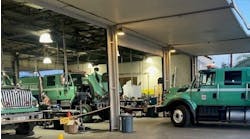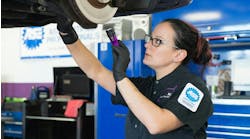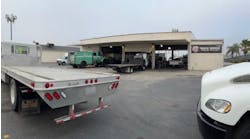Since the American Transportation Research Institute started tracking the operational cost of trucking, last year broke the record for the costliest year to operate a truck. ATRI's An Analysis of the Operational Costs of Trucking: 2023 Update revealed that "expenses rose in almost every cost center during the last year, including double-digit increases in fuel, truck and trailer payments, repair and maintenance and driver wages."
For-hire carriers cannot pass all of these increases on to their customers, and private fleets have to figure out how to minimize the cost increases to stay competitive.
Fortunately, there are steps fleets can take to try to mitigate some of these cost increases. The first step is to perform an asset analysis to see if you have the correct number and the right kinds of trucks in your fleet. You also should look at asset utilization to make sure you are not underutilizing some vehicles while overutilizing others.
See also: How to calculate a shop budget
While used truck prices are low, it still may be a good strategy to divest yourself of assets you no longer need. This is a good time to meet with your finance company to review your asset replacement strategy and begin planning for 2024 and 2025 truck purchases.
You should also be reviewing your asset specifications. Are your trucks spec'd properly for the duty cycles in which they are operating? Are you adding the proper aerodynamic devices that, despite costing more, pay off big in fuel savings over the asset's life? If you haven't performed a spec review recently, this is a good time to do so. Today's trucks are more efficient than those of even a few years ago, and there have been several improvements to add-on devices that will improve overall vehicle efficiency.
This also is an excellent time to engage your drivers in your efforts to cut costs. Drivers have as much as a 30% impact on fuel economy. Set fuel economy goals and reward drivers who meet or exceed those goals, and coach drivers who are not hitting them.
Look at your preventive maintenance schedules on an asset-by-asset basis to ensure you see vehicles at the proper intervals, depending on asset age and duty cycle. Closely monitor PM compliance to ensure that 100% of your vehicles are coming in for their scheduled maintenance service and that PMs are not being deferred.
Another area to focus on is your purchasing procedures. Have you concentrated your spending on parts so that you can take advantage of rebates and discounts? Many fleets are expanding their supply base because of supply chain issues. Since there has been some improvement in the supply chain, you may be able to consolidate your list of preferred suppliers.
Improving operational efficiencies can go a long way to taking the sting out of the higher costs of trucking.
Patrick Gaskins, SVP of Corcentric Fleet Solutions, oversees both sales and operations for the company's fleet offerings. Gaskins joined the company in 2010, bringing more than 30 years of experience as a financial services professional in the transportation industry. He leads a team that works with a supply base of more than 160 manufacturers to help the country's largest fleets manage all aspects of their fleet operations and fleet-related spending.
This article originally appeared on FleetOwner.com.




